Interview: Jost Kobusch on his Winter attempt to Everest without O2, records first ascent of Amostang
German alpinist Jost Kobusch (27) is currently in Nepal, preparing for his upcoming Solo Everest Winter Expedition without supplemental oxygen by the rarely attempted West Ridge route. Everest was climbed in Winter but no one has ever summited the peak in Winter without oxygen. On 9th November, 2019, in an exclusive interview with Dream Wanderlust, Jost Kobusch talks about his Everest Winter and upcoming projects related to it.
In the preparatory phase of climbing Everest, on 24th October, 2019, Jost made the first ascent of Amotsang (6393m), in the Damodar Himal, Northern Annapurna region. "After some stretching and enjoying the view, I had to get my skates on to get down. Because as you can see, the sun was already setting. After an hour of descent at dusk and three more hours in the dark, I treated myself with a nice cup of tea in the tent before continuing the descent the next day," Jost wrote on his Facebook Page. He will start his main goal at the end of December.
Renowned for his ode to extreme alpinism, Jost, in 2014, became the youngest climber to summit Ama Dabalam solo. In 2016, he summited Annapurna solo without supplemental oxygen, and thus, became the youngest German to do so. In 2017, he made the first summit of Nangpai Gosum II in a solo alpine style climb. In 2018, he established a new route on Carstensz Pyramid.
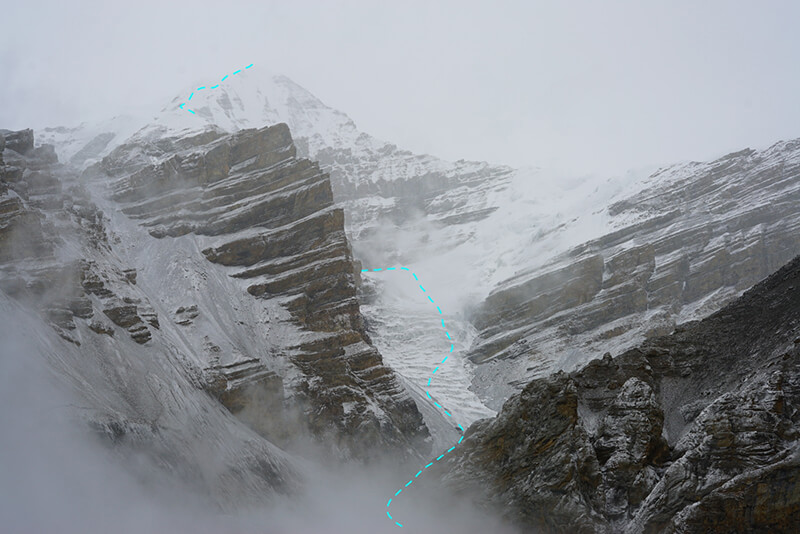
Amotsang - summit route
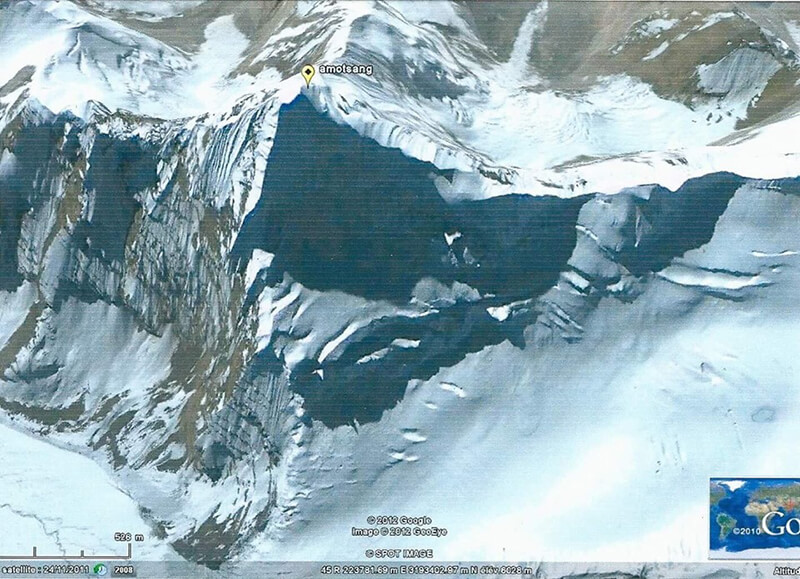
Amotsang - Google Map
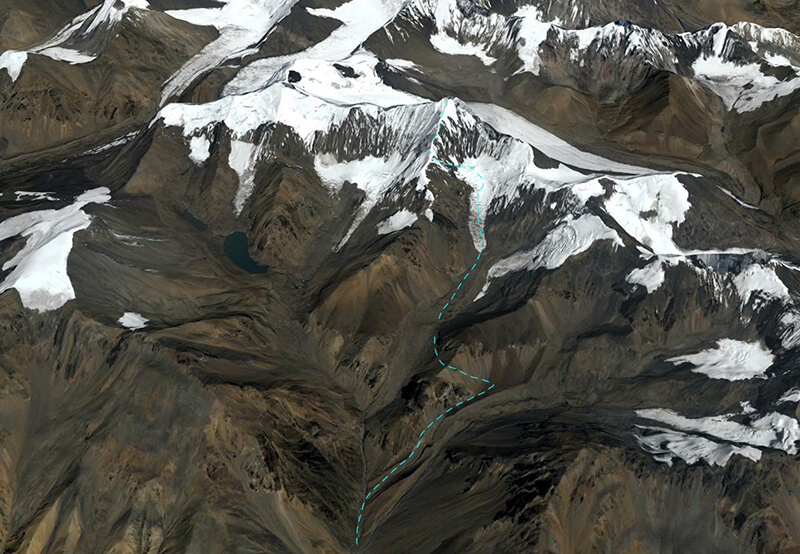
Amotsang - summit route on Google Earth
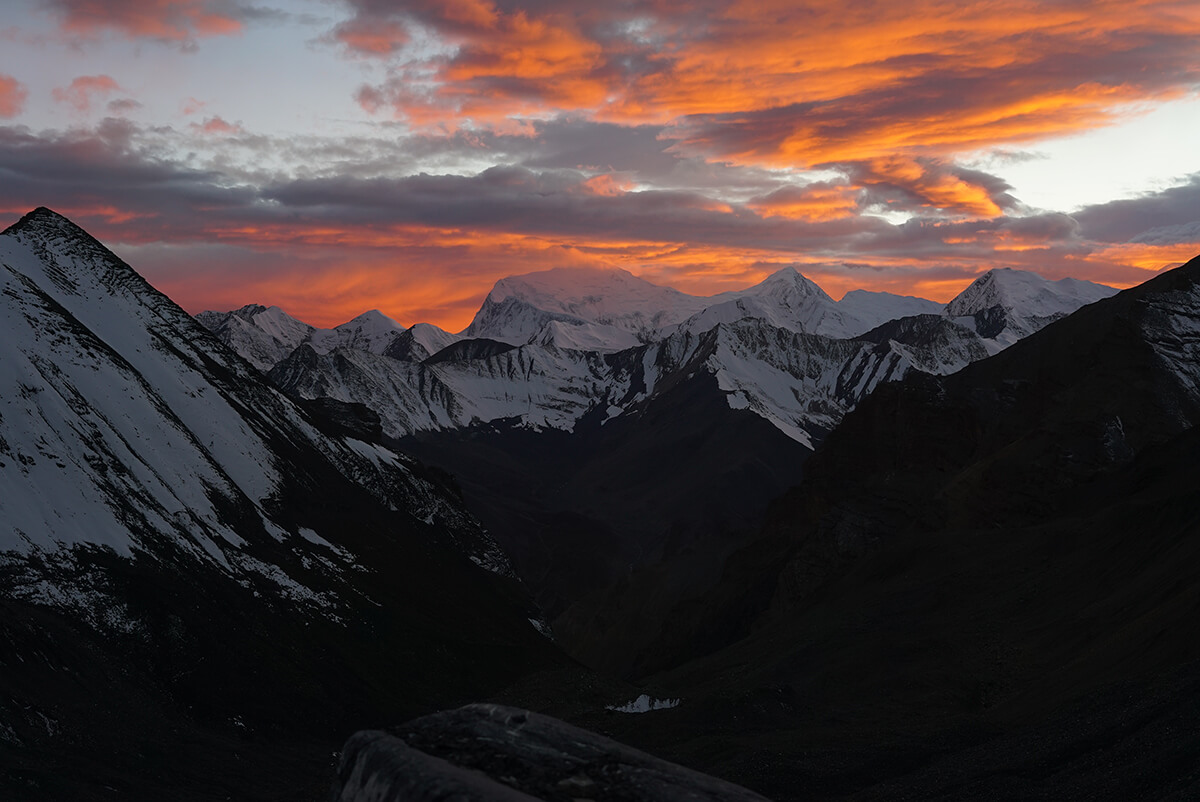
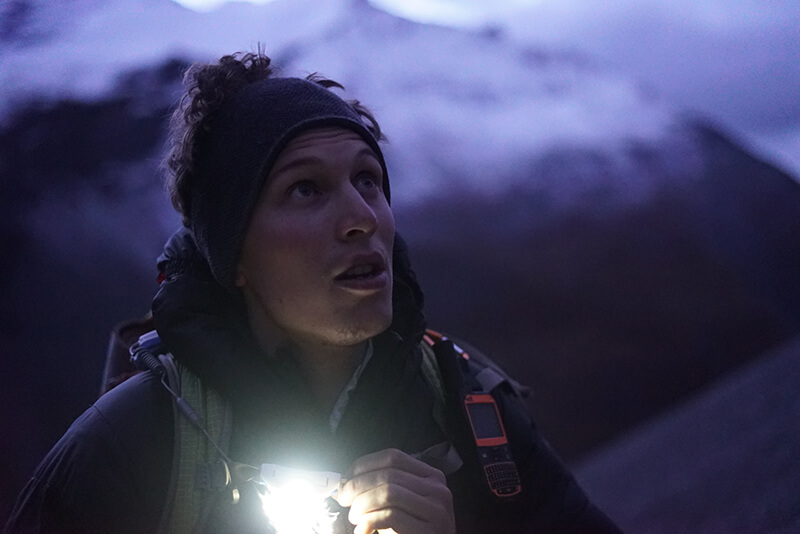
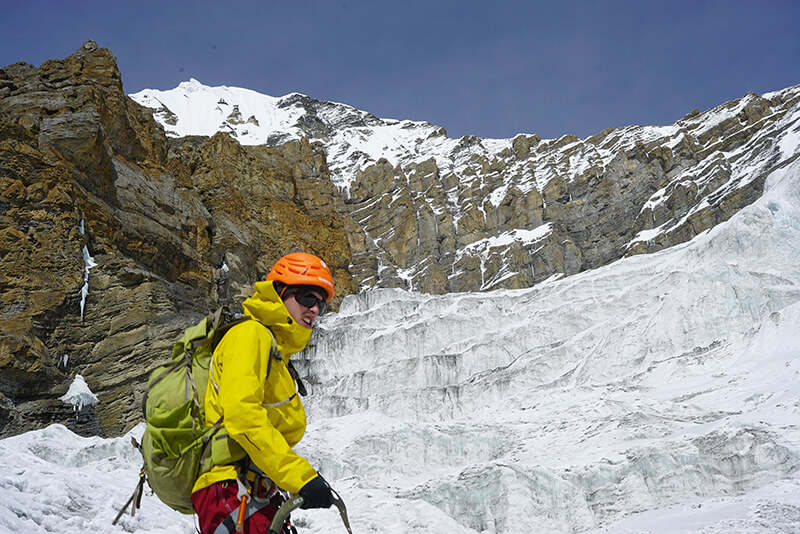
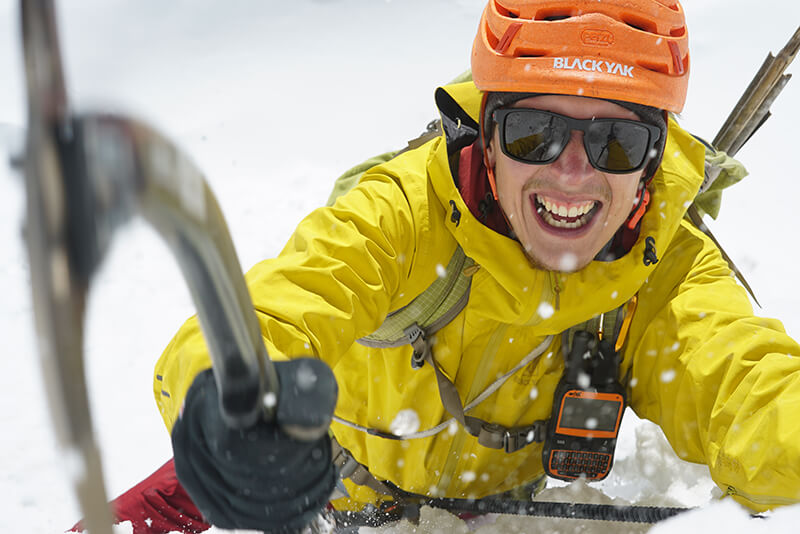
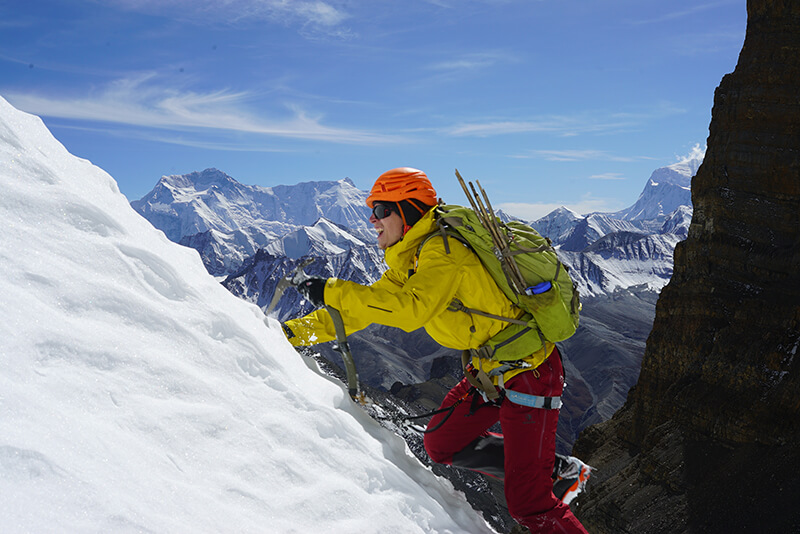
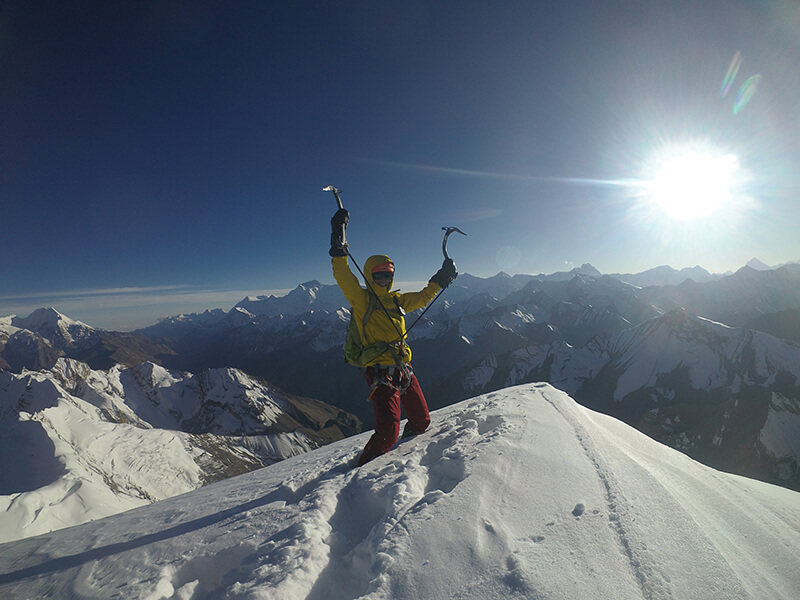
Jost on the summit of Amotsang
Interview with Jost Kobusch
DW: Why Winter? What attracts you?
Jost: True alpinism. Nobody will be there. You are on your own. Wilderness. If there are many people then it's a form of extreme tourism. To me, it is not alpinism. It is difficult thing to climb in Winter and that attracts me. I like to do things where I am not sure if it is possible. I like to try to make the impossible possible. When you go in summer you know somebody did it before so you know it's possible.
DW: What happened the first time you tried climbing in winter?
Jost: I went with my instincts and intuition. Based on what I had done before. I feel if you don't fail, then your goals are too easy. When you achieve directly what you do, then it's too easy. 50% things don't work. This Winter I was in Alaska. I tried to climb Denali. But instead I could reach only the West summit of Moose’s Tooth, because it was dark, cold and stormy. I did the first ascent of the West summit but it is lower than the main summit.
DW: How do you deal with failures?
Jost: It's easy because I never fail. Either you succeed or you learn. Learning is very important. Success is built on failures and not success.
DW: How do you judge if you have learnt something from it or if it was a failure?
Jost: Every expedition is a different chapter with different challenges. Sometimes I develop a new gear, sometimes a new strategy. It is like meditation or like cleaning your soul. You emerge as a better person.
DW: How do you get over times when you feel lonely?
Jost: After a certain time everything fades. I feel like disconnecting myself from everything. I don't feel scared more, not missing my loved ones. At the same time, I don't experience much joy and happiness. Just feel my existence. This stage starts after two weeks of expedition. I enjoy emotions. The pain you feel makes you realize that the happiness you experienced was real.
DW: How do you feel when the expedition gets over?
Jost: The expedition starts when you decide the moment you do it. There is an immediate satisfaction that you have done something. And you look forward to coming home. After this the first stage starts again where you set a new goal and look forward to achieving it. These three stages are constantly repeating and you never get tired. I was always fascinated with Everest but never wanted to go there with the crowd. But I realised if I go there in Winter it would still be fascinating as it is the highest mountain.
DW: Why are not taking the usually taken route to Everest?
Jost: Because then I will need to pass by Khumbhu glacier, the fastest moving glacier. For passing through the glacier, you need to have a large team. But I prefer going alone without much support. The west ridge is difficult to enter. Not much ice is expected to be there. It is going to be a training situation for me. I need to see what works and what doesn't. I need to re-evaluate according to circumstances.
DW: Don't you feel you are taking risk by undergoing training on Everest itself where you wish to eventually reach the summit?
Jost: But if I undergo training on a different peak, then I will learn how to summit that particular mountain.
DW: Why don't you go with a team? Why are you going solo?
Jost: If I with a team, I will learn how to climb with a team and not learn how to ascend solo. The goal is to summit Everest solo in winter. There is no better training than trying to reach Everest solo.
II don't always go solo and I choose solo for big projects. I believe that soloing is the purest form of alpinism. To me, this is the most natural thing and the highest form of freedom when you are in solo. I have a lot of freedom and I enjoy this freedom. I take my own decision, I take my own route, I go by my own speed. I can be selfish all the time but when you go in a team I depend on the others or the person will depend on me. If something happens to me I put the other person in risk or vice versa. On the mountain there is very limited help. I enjoy being selfish. If I do some technical climbing rather than Everest then maybe I can choose the right partner.
DW: How do you manage to get sponsorships for this particular project considering that there might not be a positive outcome and might just be a training expedition?
Jost: I had a hard time getting funds for this project. But in this project, I partly self-funded. I also got financial support from the people who believed in me.
DW: What would be the schedule of your expedition? When will you start?
Jost: My photographer Daniel Hug and I will move toward Everest Base Camp do some photography and shoot some videos. Post this, we take everything down. Full-fledged Expediton will start from 22nd December and will last till 29th February, 2020. I will move back to Kathmandu in the beginning of March.
I will start in the beginning of calendar Winter and I will end this expedition with the end of the meteorological Winter. I am not sure about the calendars. Some people say meteorological Winter starts on 1st December and ends on 29th February and calendar Winter starts on 22nd December and ends on 22nd March. I am just taking the tightest definition as because I believe Winter starts from end of September and ends in the month of February.
DW: What are you looking for in your final expedition summit attempt?
Jost: I am looking for the meaning/direction to my life that will give me a purpose. At the end of the day I am climbing some ice covered meaningless stone hill that nobody will give the fact. I am doing this only for myself. I enjoy the journey into the unknown that I am not sure whether it works or not. So, I choose to solve the boulder problems just in a big scale. I will look for different techniques and different sections to succeed and to enjoy the process. I like to develop myself and grow with things and that is the aim of this project.
DW: How many attempts are you looking for and at the most what is the highest point you will wait for before deciding that it's good to return or I can wait?
Jost: I am doing this until it works. This time I will go to the point where the preset conditions that I set before me, like for example if there is more than 40km/h wind speed in the summit point then I will not go up. So there are certain things I set before as limits. So, when I am up there, I don't need to think what I do. When you are up there it's like being drunk and if you start solving mathematical problems in that situation then you will get the wrong solutions. So if certain things go wrong that I set before, I will return that moment and try for another attempt in the next season or may be in the same season. But I will do it as long as I can give a meaning to this project. As I believe if you can't give meaning to what you do then you will not be able to do it.
DW: How are you preparing?
Jost: Time is the key to success. I am giving a lot of time to acclimatization to get used to this altitude.

Jost Kobusch interviewed by Nutan Shinde from Dream Wanderlust at Kathmandu on 9th November, 2019
DW: How do you prepare for extreme cold or Winter cold? What about mental preparation?
Jost: Prior to this project, I did an expedition in Alaska in the polar Winter for mountaineering. So, I prepared in extreme cold -40°c with no wind shield at low altitude with darkness. I have also made sure that I have the best gear available to take care of all the problems.
I believe that mountaineering in the way I do is enough for mental preparation or mental training.
DW: But what about preparation for the risk this expedition to Everest poses and it brings something different?
Jost: This is only something people know. Everybody knows Everest. The risk is in me being self-sufficient and I know there will be no support team coming to rescue me. This is the risk and I have to take this risk as I believe without risk there is no adventure. It's an exploration and that's what I love to do.
DW: How are you planning for the rescue part as there is no one for rescue? How are you planning to solve the worst conditions?
Jost: I plan in these very critical rock sections, not necessarily low, I plan to put one fix line so that I will be able to rappel on this rock climbing section also with an injury and rescue team can potentially go up there. And the rest will be just defensive climbing just to minimize relative risk.
DW: Have you been anywhere in this situation where you had rescued yourself?
Jost: I never got rescued from the mountain although I had some close call due to some mistakes I did like anchoring, putting the crampon at wrong spot etc. I made some wrong choices from where I learn. In those critical conditions I followed my instinct and my instinct comes from my experience.
DW: Are you scared of death?
Jost: I think deep down I am scared to die. My idea of fear is that we all fear to die and losing our existence. Whenever I am in the mountains, I neither think of dying nor about fear.
DW: What drives you?
Jost: I am a very curious person. I am curious about anything and not only about the mountaineering. When I was a kid I used to skateboard and I was curious about jumping too. I tried riding horses, I do skating, sailing, swat fighting, took a mountain bike and did jumps over self builds thing. I am always curious about mountaineering. I always question myself about its challenge.
DW: How do you decide on your next project?
Jost: I want to do so many things. I have 10 projects on my mind and these things really challenged me.
DW: As a part of preparation for Everest why did you select the unclimbed peaks?
Jost: I selected the one unclimbed peak that is 6000m and also I was looking for another peak but later I came to know that peak is already climbed. One of my friends is a Historian. He sent me a picture and then I researched it on Google Earth and got to know about the unclimbed peak. I wanted to know if it is possible to climb the peak that's why I selected the unclimbed peak. It's a different feeling that nobody has ever been before on that peak so it is like an exploration. I enjoyed the atmosphere and for me it can excel your knowledge about the unclimbed one.
DW: When do you get the confidence that yes I can do it? Of course there is some fear, some uncertainty.
Jost: Actually I don't know if I can do it. I just hope to do it. But I use my experience and study the terrain. I can look at the mountain and can see the possible line. From there, I just approximate the probability of doing the thing. Although I changed the plan three times because I don't have any idea about crevasse and snow conditions.
DW: What about the acclimatization process? How do you assess the acclimatization time?
Jost: Last year I read a lot of books and most of them said approximately after 3 weeks, our body is accustomed to such an height. From my previous experience, I feel I need a minimum exposure of 3 weeks to maintain my preparation and if I have more time that will benefit me more. I have a device that will record everything and in the next summer I will analyse the data to get the correct information about acclamation.
DW: Going without oxygen? Do you think it is true alpinism?
Jost: I believe that you shouldn't only adjust the environment to your skill but your skill to the environment. That means if you use supplemental oxygen then it's doping. I think it's cheating. It's like if somebody would use supplemental oxygen during the tour de France.
DW: Are you going to carry some oxygen?
Jost: No, look if I carry some it would increase the weight and secondly how do I prove that I have not been using it. So I am not using the supplemental oxygen not even in the Base Camp.
DW: What do you think about speed climb? Do you think the alpinism has to be an athletic form?
Jost: I personally can understand the satisfaction of moving fast in the mountain and sometimes, to climb the peak in a record time, from bottom to top, it's really enjoyable and it’s really a great exercise. But to me personally, speed climb is artificial because in the end time it is so artificial and it is the human intervention. May be at one point I will change my mind, I can run fast. To me alpinism is to find a new way, it's about working with instinct rather than with map of somebody drawn for it with all the information pointed out. It's very much comfortable to choose the same route as we have the idea of difficulty. I don't follow somebody rather than create my own approach.
DW: What does your family think about this project?
Jost: My family is worried about me. But I do believe that there can be nothing greater that your son/child doing the same thing what they love doing. If I can fulfill my purpose then they will also be very happy. In the beginning there were some issues and they did not understand my mountaineering. But after a few years they understood me that a professional mountaineering is also a job. They really like what I do and they are proud of me.
Photo Courtesy: Jost Kobusch






